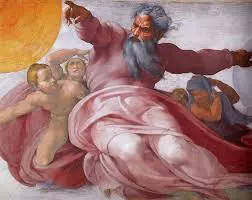Holy Scripture, in relating the origin of the first man, says:
God said: let us create man in Our image, (and) according to Our likeness (Gen. 1:26).
About the creative act itself, the writer of Genesis narrates:
And God created man in His image, in God’s image He created him: male and female He created them (Gen. 1:27).
The image of God in man, according to the words of St. Apostle Paul, is “in righteousness and holiness of truth” (Eph. 4:24), i.e. in the actual perfection of man’s spiritual powers directed to God, as it was with Adam and Eve until their fall. And when they sinned, the image of God darkened among them, although even after the fall, the spiritual powers that God gave him at creation remained in man, namely: the mind, which always strives to know the truth, the heart, which thirsts for love, and the will that wills the good.
Due to the close connection of the soul with the body, the image of God is also reflected in the human body. The body of the first man corresponded to his soul and was a reflection of its godlikeness. It is said in the New Testament that the bodies of regenerated Christians are temples of the Holy Spirit who dwells in them, and that we should glorify God not only in our souls but also in our bodies (1 Cor. 6:19-20).
The likeness of God in man consists in the corresponding development and improvement of man’s spiritual powers. So we receive the image of God from God together with our being, and the likeness to a significant extent must be acquired by ourselves.
Hence the following differences between the image and likeness of God in man:
a) there is an image of God in every person, even in those corrupted by sin (Gen. 9:6), but the likeness of God does not belong to everyone;
b) the image of God cannot be destroyed even at the lowest stage of the human fall, because even in this state, reason, freedom and feeling remain in man, even though they obtain a false direction in him. The image of God in man may not be there at all;
c) finally, the image of God is a constant, unchanging aspect of the human soul, and the likeness can change, sometimes exalting, then obscuring the image of God in the soul. The infinite goal indicated to our soul, so that it becomes completely like God, was given to us by the Savior in the words:
Be perfect, as your heavenly Father is perfect (Matt. 5:48).







